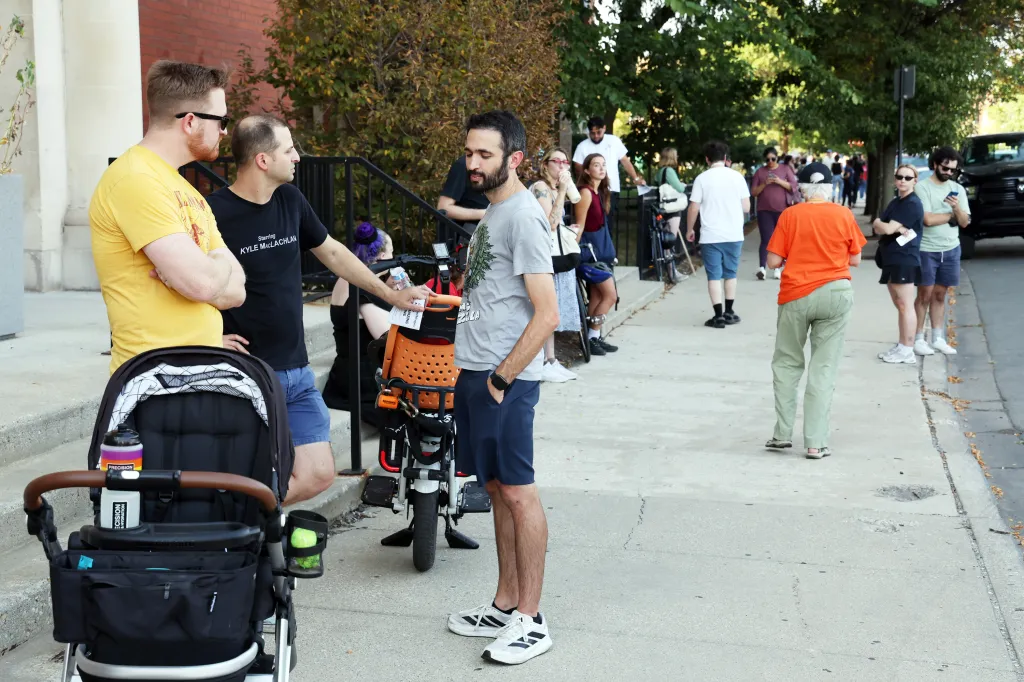Copyright Chicago Tribune

I pick my daughter up from school every day and fight to keep my composure. The teachers are positioned on corners around the school, looking out for suspicious vehicles. Red whistles hang from their necks, walkie-talkies in hand, ready to signal danger. I can see both fear and calm in their faces — the quiet strength that I think drew them to teaching in the first place. The school in Chicago serves mostly Mexican and Ecuadorian families. Walking through the building feels like stepping into Disney’s “Coco”. It’s almost time to celebrate the Day of the Dead, and the kids are busy making marigolds out of tissue paper, baking pan de muerto, and bringing in photos of loved ones to add to the altars. Latin Heritage Spirit Week just wrapped up, and the kids went all out — dressed as their favorite soccer players, wearing clothing from their families’ home countries and showing off the colors of their flags. I also got the chance to taste some traditional dishes, including colada morada, a sweet, spiced purple corn drink that celebrates the journey from life to death. Experiencing these celebrations has been a special treat for me. I am the one benefiting from their traditions and the love they show each other. Their spirit is part of why I chose this school for my daughter. But all of this reminds me that these families, for reasons beyond their control, came here seeking a better life. They left behind everything familiar — people, places and experiences they may never get to share with their children. I think of my friends’ kids who recently visited their grandparents in Ecuador, learning for the first time to make indigenous dishes special to their Kichwa roots, picking maracuyá (passionfruit) from the tree, and walking up the hill to turn on the stream-fed waterline that carries water from the mountain to the farm — chores that were once routine for their parents but now feel like exciting ways for their children to connect with their culture. These are the kinds of experiences families value — small ways for their children to experience a piece of the home they left behind. Even as these kids get to experience pieces of the home their parents love, the world outside the school tells a different story. That fear waits just outside the front door. Just six months ago, my daughter would beg me for cotton candy from one of the after-school vendors, and we’d stay on the playground a little longer before heading home. Now, the vendors are gone, the playground is closed and the small routines that once made the day feel full have quietly disappeared because of fear. In recent weeks, many families have decided it’s safer to keep their children home. They’d rather stay together than risk being separated. In some homes, the parent with the safer job goes to work while the other stays home to avoid being taken away. Many street vendors still take the risk, knowing that each day out could be their last. They live with fear every day — fear of waiting for the bus, fear of driving, fear of standing outside the school to pick up their child. Some families have chosen to return to their countries rather than face the possibility of separation. It doesn’t matter whether they were born here, are on the pathway to citizenship or are hoping to become citizens — the fear is the same for everyone. At the park, I used to sit on the bench watching families grill carne asada while kids played soccer and salsa music blared from a speaker, wishing I could be part of it. That’s what family looks like to me — the same warmth and joy I see every day at school. But lately, some of those same families tell me they’re staying home, avoiding the places they love. Fear is stealing the simple moments. Going to school, to work or to the park — these are all things no one should have to weigh as risks. Yet you can see the fear in what’s no longer there: kids kept home from school, the cotton candy vendor gone, parks that were once filled with music now quiet. Through all of this, the teachers keep watch on the corners, walkie-talkies in hand, ready to blow their red whistles. The whistle signals danger, but it doesn’t erase the fear these families live with every day — a fear that feels louder than any whistle could ever sound. Allison Pleas is a Chicago parent with a background in the arts who volunteers weekly in her daughter’s predominantly Latino elementary school. Her writing explores family, community and everyday life in her neighborhood.



